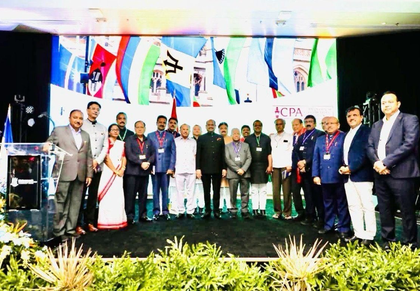Barbados conference: Delhi Speaker calls democracy a living culture of dialogue
By IANS | Updated: October 9, 2025 22:30 IST2025-10-09T22:25:29+5:302025-10-09T22:30:05+5:30
New Delhi, Oct 9 Delhi Assembly Speaker Vijender Gupta said on Thursday that democracy derives its true strength ...

Barbados conference: Delhi Speaker calls democracy a living culture of dialogue
New Delhi, Oct 9 Delhi Assembly Speaker Vijender Gupta said on Thursday that democracy derives its true strength when every voice — irrespective of gender, region, or class — finds equitable space in decision-making.
Participating in a workshop during the 68th Commonwealth Parliamentary Conference (CPC) in Bridgetown, Barbados, Gupta, while sharing his views on the theme ‘Strengthening Our Institutions to Support Democracy’, underscored the imperative of reinforcing democratic institutions, promoting inclusive governance, and deepening the moral foundations of constitutionalism across the Commonwealth.
The conference will culminate on October 12.
Gupta highlighted that democracy, in its truest form, must evolve beyond electoral representation into a culture of equality, accountability, and civic participation.
He emphasised that institutional resilience and ethical governance are indispensable to sustaining public faith in democracy.
“The strength of a democracy,” he observed, “is not defined by the frequency of elections but by the fairness of its institutions, the inclusiveness of its representation, and the conscience of those who govern.”
Reflecting on India’s democratic journey, Gupta noted that the country’s pursuit of inclusive representation began with the 73rd and 74th Constitutional Amendments of 1993, which institutionalised Panchayati Raj and municipal governance and reserved one-third of all seats for women in local bodies.
This milestone, he said, brought over 1.4 million women into active public life, transforming the fabric of grassroots democracy.
Extending this vision to higher legislatures, Gupta referred to the Constitution (One Hundred and Twenty-Eighth Amendment) Bill, 2023 — recently passed by Parliament —which reserves one-third of all seats in the Lok Sabha and State Legislative Assemblies for women, including those reserved for Scheduled Castes and Scheduled Tribes.
He described this as a “moral and constitutional milestone in realising gender justice and participatory democracy,” ensuring that governance reflects the aspirations and agency of every segment of society.
The Speaker drew attention to a series of electoral and institutional reforms undertaken in India over the past decade, which have strengthened transparency, accessibility, and public trust in governance.
He highlighted the extension of voting rights to Non-Resident Indians (NRIs), the introduction of online voter registration, the inclusion of the ‘None of the Above’ (NOTA) option in Electronic Voting Machines, and the implementation of the Voter Verifiable Paper Audit Trail (VVPAT) system—all of which have made elections more inclusive, transparent, and credible.
Gupta also referred to the Supreme Court’s landmark judgments striking down Section 8(4) of the Representation of the People Act, 1951 — ensuring the immediate disqualification of convicted legislators — and permitting under-trial prisoners to contest elections, both of which have reinforced accountability in public life.
Disclaimer: This post has been auto-published from an agency feed without any modifications to the text and has not been reviewed by an editor
Open in app